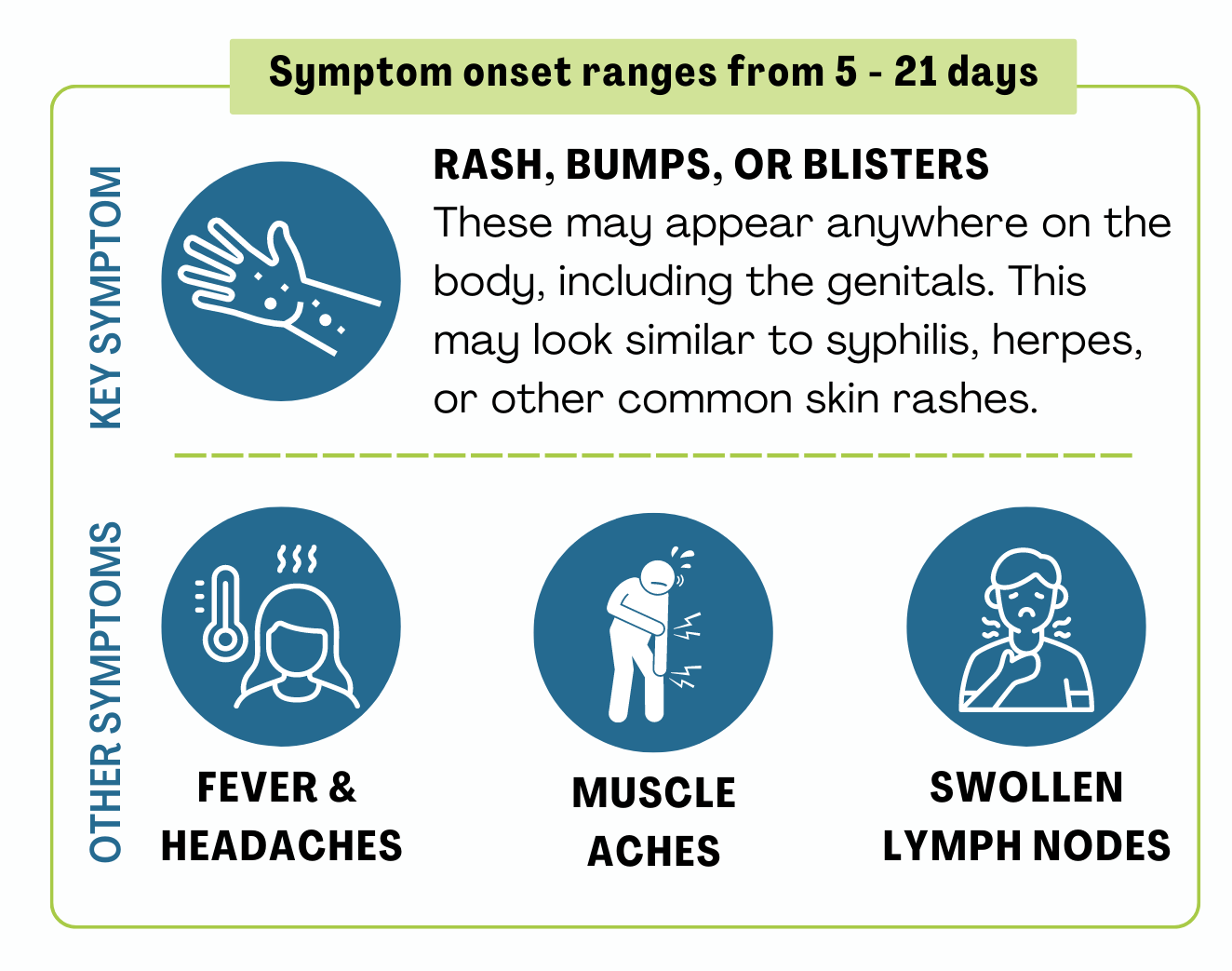Ventura County Public Health (VCPH) has and will continue to monitor mpox (previously known as monkeypox) locally. At this time there are a few confirmed cases in Ventura County and while anyone can get mpox, based on the information currently available, the risk of mpox to the general population remains low.
| Number of Probable and Confirmed Cases in Ventura County | 31* |
Latest Updates
- VCPH Confirms First Case of Mpox in Ventura County (07-22-2022)
About Mpox
Mpox is a rare disease that is caused by infection with mpox virus. Mpox spreads through prolonged skin to skin contact. Taking steps to avoid prolonged skin to skin contact can reduce your risk of getting mpox. Contact includes:
- sex
- kissing
- breathing at very close range
- sharing bedding and clothing
If you have sex or close physical contact with many people you have a higher chance of getting mpox. Mpox can be serious, though most cases resolve on their own. You should see a doctor right away if you think you have been exposed.
Symptoms
 Mpox symptoms usually start within 2 weeks of exposure to the virus. Initial symptoms are similar to flu (fever, headache, fatigue, swollen lymph nodes), followed by a rash and sores that look similar to herpes sores. The rash or sores may be located on or near the genitals or rectum but could also be on other areas like the hands, feet, chest, or face.
Mpox symptoms usually start within 2 weeks of exposure to the virus. Initial symptoms are similar to flu (fever, headache, fatigue, swollen lymph nodes), followed by a rash and sores that look similar to herpes sores. The rash or sores may be located on or near the genitals or rectum but could also be on other areas like the hands, feet, chest, or face.
Testing and Isolation
If you develop a suspicious rash or were in contact with someone who has tested positive for mpox, speak to your doctor right away for guidance and testing. If you do not have a doctor, please visit: Ambulatory Care to find a clinic near you.
If you have mpox or are waiting for test results,
- Stay away from other people
- Don't use public transportation
- Get in touch with people you've had sex or close contact with and ask them to get tested.
For additional preventative measures to take at home, visit CDC’s home isolation and infection control guidance.
Treatment
Most people get well from mpox without needing any medicines or other treatment. There is no medicine that the FDA has approved for mpox infection. However, there is one medicine that is used for severe mpox, called tecovirimat, or TPOXX. It is allowed as an “investigation” drug for special circumstances for people who have severe monkeypox.
Talk to your doctor if you think you might need TPOXX because of a special condition or severe disease. If you need TPOXX, your doctor will work with VCPH, or other providers to get you TPOXX.
Vaccination
The mpox (Jynneos) vaccine is free and available to individuals who wish to receive it. If you think you are at risk for mpox infection, then you may receive the vaccine. CDPH recommends that those who may be at risk for, or seek additional protection from mpox infection, be vaccinated against mpox.
First and second doses are now available at the following sites. Appointments are strongly encouraged, but walk-ins are available. To make an appointment, call 805-981-5221.
Prevention
- Avoid intimate and physical contact with anyone who has symptoms
- Talk openly with sexual partners prior to intimate physical contact
- Consider covering exposed skin in dense, indoor crowds
- Don't share bedding, clothing with others
- Stay aware if traveling to countries where there are outbreaks
Resources
- What You Should Know About Mpox: English | Spanish
- Information For Gay and Bisexual Men Regarding Mpox: English | Spanish
- What You Should Know About Intimate Contact and Mpox: English | Spanish
- Information about Mpox from the CDC
- Information about Mpox from CDPH
